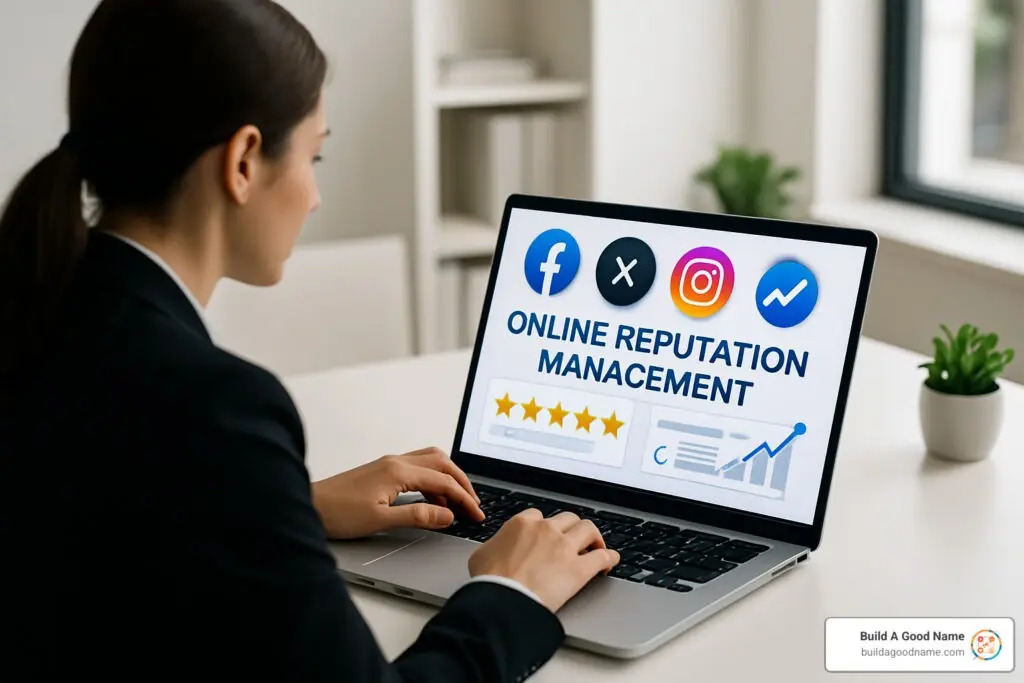Why Your Business Needs Professional Reputation Management
Online reputation management companies help businesses monitor, protect and improve their digital presence across review sites, social media and search engines. Here’s what the best providers actually do:
- Track mentions and reviews on 100+ platforms in real time
- Craft professional, timely responses that turn critics into fans
- Encourage happy customers to share authentic feedback
- Publish search-optimised, positive content that outranks negative press
- Provide crisis playbooks so you’re ready if a PR storm erupts
The stakes couldn’t be higher. 97% of consumers search online for local businesses before buying, and 75% read reviews. A single unchecked complaint can cost thousands in lost revenue and trigger a snowball of distrust.
The good news? Partnering with the right reputation team transforms your digital footprint from a liability into a competitive advantage.
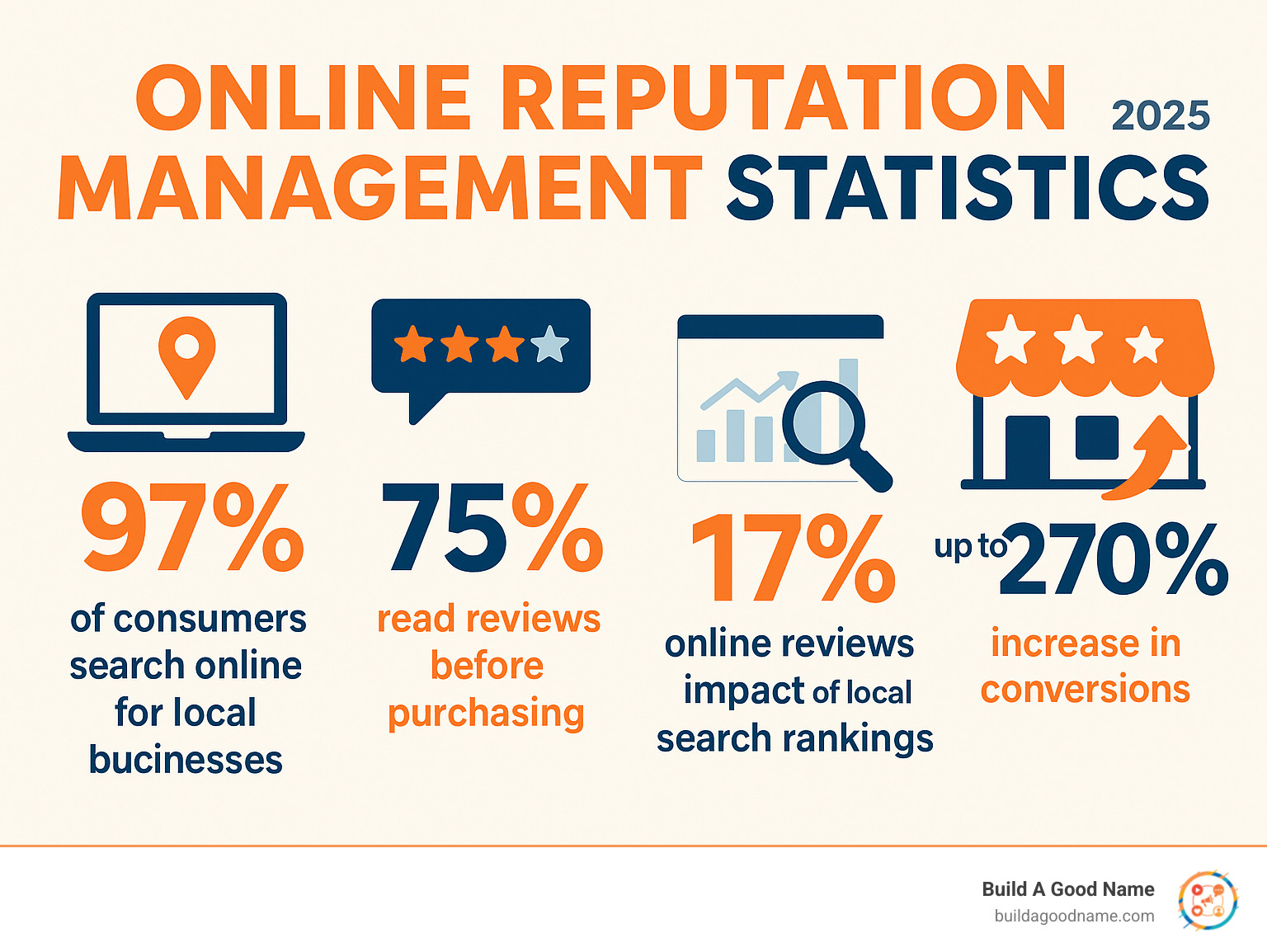
The High Stakes of Your Digital First Impression
Picture this: a potential customer compares your business to another while scrolling on a phone. Within seconds they scan star ratings, skim comments and decide where to spend money. According to BrightLocal’s Local Consumer Review Survey, 97% of consumers search online for local businesses and 67% use more than one site for research.
Managed well, reviews boost conversions by up to 270%. Managed poorly, they create a leak in your sales funnel that’s almost impossible to plug. Reputation even affects hiring—69% of job seekers avoid companies with poor online sentiment—and it drives roughly 17% of local search rankings, so it literally determines whether prospects can find you at all.
Why Every Business Needs a Reputation Strategy
Local and organic searches account for nearly 69% of total digital traffic, making reviews a primary findy channel. A structured plan helps you capture fresh feedback, highlight wins and address issues before they escalate. Learn more in Why Reputation Management Matters for Your Brand.
The Cost of a Bad Reputation
92% of shoppers hesitate to trust brands with few or poor reviews. We’ve seen businesses lose up to 35% of revenue after a cluster of unanswered complaints. Negative stories spread faster, linger longer and repel top talent. Mastering tactics like Filter Negative Reviews and timely, empathetic responses is essential—one neglected comment can snowball into a full-blown crisis.
How to Choose the Right Online Reputation Management Partner
Finding the right online reputation management companies can feel overwhelming, but it’s one of the most crucial decisions you’ll make for your business’s digital future. The wrong partner can waste your money and potentially make your reputation problems worse. The right one can transform your online presence into a competitive advantage.
Start with the basics: how long have they been in business? Reputation management isn’t something you learn overnight. Look for companies with a proven track record and real experience handling situations like yours. The best partners will have weathered different economic cycles and platform changes.
Any reputable firm should be excited to share case studies and client testimonials. If they’re secretive about their methods or can’t show you concrete examples of their work, that’s a red flag. You want partners who are proud of their results and transparent about how they achieve them.
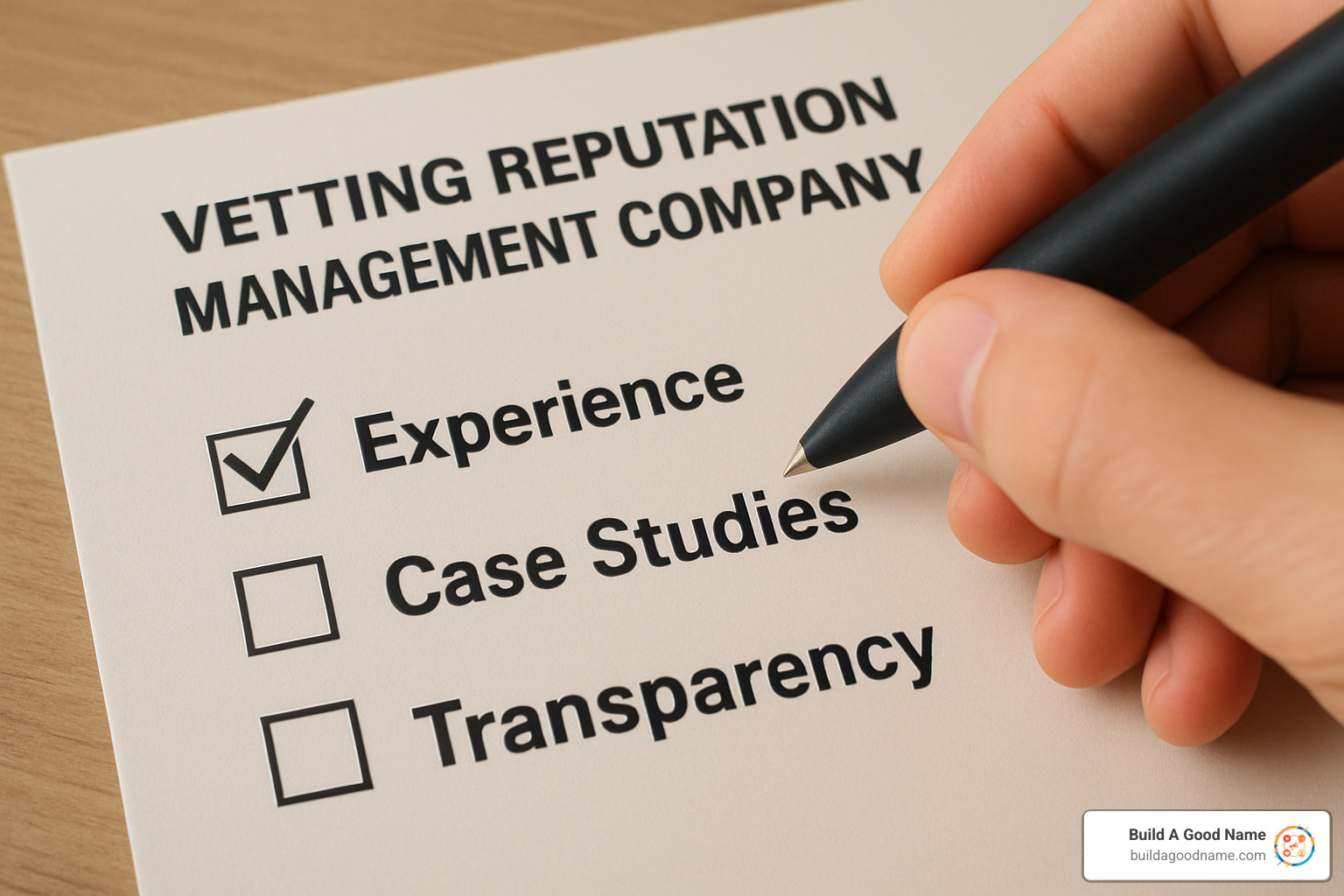
Key Characteristics of Leading Online Reputation Management Companies
The best online reputation management companies share some key traits that separate them from the rest. These characteristics can help you identify partners who will actually move the needle for your business.
Experience matters more than flashy promises. Look for companies that have been around long enough to understand how different platforms work and how reputation crises actually unfold. They should have stories about helping businesses through tough times, not just generating positive reviews.
The best companies balance offense and defense. They don’t just wait for problems to appear—they actively build positive content and engage with customers to prevent issues. As Mastering Reputation Management in Business Today explains, the most effective approaches combine prevention with response.
They focus on relationships, not just damage control. Great reputation management is fundamentally about helping you connect better with customers. The companies that understand this create sustainable improvements rather than quick fixes that fall apart later.
They think long-term. Reputation management isn’t a one-time project—it’s an ongoing process. Quality companies recognize that reputation and reviews naturally decay over time without consistent attention. They build maintenance into their service offerings from day one.
They understand local search. With local and organic searches accounting for up to 69% of overall digital traffic, your reputation management partner must understand how reputation factors into local search rankings. This expertise directly impacts your visibility and revenue.
Transparency in Services and Pricing
One of the biggest warning signs in the reputation management industry is companies that won’t be upfront about their pricing or services. If they can’t clearly explain what they do and how much it costs, how can you trust them with your reputation?
Clear pricing models should be available without jumping through hoops. You shouldn’t need to sit through lengthy sales presentations just to understand what you’re buying. Reputable companies publish their pricing openly because they’re confident in the value they provide.
Service scope should be crystal clear. What platforms will they monitor? How quickly will they respond to negative reviews? What kind of reporting will you receive? These details matter because they determine whether you’re getting real value or just paying for monitoring software you could buy yourself.
Avoid companies that promise guaranteed content removal. While some content can be removed through platform policies or legal action, much of reputation management involves suppression rather than removal. Honest companies will explain the difference and set realistic expectations about what’s possible.
Watch out for hidden fees. Some companies quote low monthly rates but charge extra for everything that actually matters—like responding to reviews or creating positive content. Make sure you understand the total cost of getting results, not just the entry-level price.
| Service Level | Typical Inclusions | Price Range |
|---|---|---|
| Basic Monitoring | Review monitoring, basic response templates | $500-$1,000/month |
| Proactive Management | Review generation, social media management, SEO | $1,000-$3,000/month |
| Crisis Control | Content suppression, crisis communication, legal support | $3,000-$10,000/month |
Communication, Reporting, and Real-Time Results
The quality of communication often separates great reputation management companies from mediocre ones. You should expect regular updates, detailed performance reports, and clear metrics that show your progress.
Real-time results aren’t just nice to have—they’re essential in today’s fast-moving digital environment. The best companies provide dashboards that show review activity, sentiment trends, and response times. This transparency lets you see the value of your investment and make informed decisions about strategy adjustments.
Customer Feedback Management requires sophisticated systems for tracking, analyzing, and responding to customer input across multiple platforms. Your reputation management partner should have robust systems for managing this complexity, not just basic monitoring tools.
Look for dedicated account managers and multiple communication channels. You should be able to reach your team when issues arise, not just during scheduled check-ins. When a reputation crisis hits, you need partners who are responsive and accessible.
Performance reports should tell a story, not just dump data. The best companies explain what the numbers mean for your business and provide actionable insights for improvement. They should track metrics that matter to your bottom line, not just vanity metrics that look impressive but don’t drive results.
The Modern ORM Playbook: What a Good Plan Includes
Think of reputation management like tending a garden. You can’t just plant seeds and walk away—you need ongoing care, regular watering, and quick action when weeds pop up. The best online reputation management companies understand this balance between nurturing growth and handling problems as they arise.
A solid reputation management plan starts with knowing where you stand today. This means taking a hard look at your current online presence, seeing what competitors are doing right (or wrong), and spotting potential trouble spots before they become real problems.
The modern digital landscape is complex, and your strategy needs to reflect that reality. Your customers aren’t just leaving reviews on Google—they’re sharing experiences across dozens of platforms, from Facebook and Yelp to industry-specific sites you might not even know exist. A comprehensive plan addresses all these touchpoints simultaneously.
The most effective approach combines strategic planning with flexibility. You need clear processes for day-to-day reputation management, but also the ability to pivot quickly when unexpected challenges arise. This ongoing management approach ensures your reputation stays strong over time, not just in response to individual incidents.
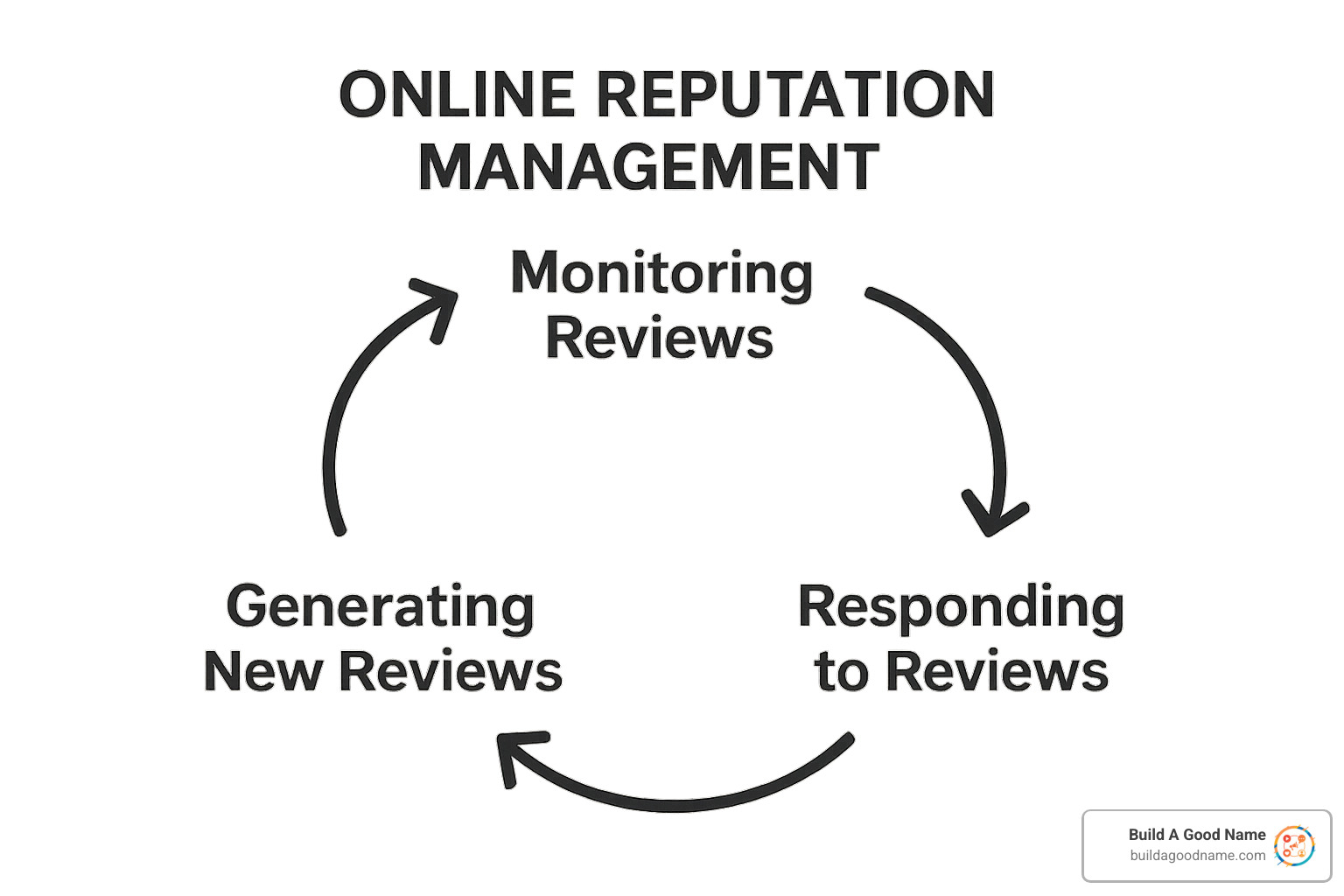
Proactive Strategies: Building a Wall of Positive Content
The smartest reputation management happens before problems occur. By consistently building positive content and engaging with happy customers, you create a protective barrier that can withstand the occasional negative review.
Review generation forms the foundation of this proactive approach. Customers want to see recent, authentic reviews when they’re researching businesses. This means you need simple, systematic ways to encourage satisfied customers to share their experiences online.
Generate More Google Reviews should be a top priority because Google reviews carry enormous weight in both search rankings and customer decision-making. The key is making the process effortless for customers while ensuring every review feels genuine and helpful.
Positive content creation extends far beyond reviews. This includes blog posts that showcase your expertise, social media content that highlights customer success stories, and thought leadership pieces that position you as an industry authority. Each piece of content serves multiple purposes—it provides value to your audience, improves your search engine rankings, and creates positive associations with your brand.
Social media monitoring allows you to catch and respond to customer feedback in real-time. When you engage with customers quickly and helpfully on social platforms, you often prevent small concerns from becoming formal complaints or negative reviews.
SEO for brand terms ensures that when people search for your business name, they find positive, brand-controlled content rather than negative reviews or competitor information. This requires ongoing content creation and optimization, but the investment pays dividends in customer perception and trust.
The goal is creating such a strong foundation of positive content that occasional negative feedback gets lost in the noise of satisfied customers singing your praises.
Reactive Strategies: Handling Negative Feedback and Crises
Even with the best proactive strategies, negative feedback will occasionally surface. The difference between businesses that thrive and those that struggle often comes down to how they handle these challenging moments.
Responding to negative reviews is both an art and a science. Research shows that responding to reviews can increase your revenue by up to 35%, but the tone, timing, and content of your responses matter enormously. A defensive or dismissive response can make a bad situation much worse, while a thoughtful, empathetic response can actually strengthen customer relationships.
Best Responses to Google Reviews provides frameworks for addressing different types of feedback professionally. The goal isn’t to “win” arguments with unhappy customers—it’s to demonstrate to future customers that you care about service and take feedback seriously.
Content suppression becomes necessary when negative content ranks highly in search results for your business name. This involves creating and promoting positive content to push negative results down in search rankings. Google Reputation Repair often requires sustained effort over several months, but the long-term benefits justify the investment.
Crisis communication planning prepares you for more serious reputation threats. This includes having pre-approved response templates, designated spokespersons, and clear escalation procedures. The faster you can respond to a developing crisis, the better your chances of containing the damage and maintaining customer trust.
The most successful businesses treat negative feedback as opportunities for improvement rather than attacks to defend against. This mindset shift transforms reactive strategies from damage control into genuine customer service and business development tools.
Build A Good Name: Solutions for Every Business Size
At Build A Good Name, we know that one size doesn’t fit all when it comes to reputation management. That’s why we’ve built our AI-powered platform to work for everyone—from the corner bakery to the growing regional chain.
We focus on what really moves the needle: getting great reviews, responding like a human (not a robot), and making sure your best customers’ voices get heard. As the reputation management industry has evolved, we’ve learned that reputation management has matured from simply burying negative content to guiding the conversation from the start.
Our Reputation Management Tools are designed for real business owners who don’t have time to become reputation management experts. You shouldn’t need a PhD to protect your business’s good name.
When to Choose Full-Service Reputation Management
Sometimes you need the big guns. Full-service reputation management makes sense when your situation is complex or you simply don’t have the bandwidth to handle it yourself.
Complex crises are the obvious example. When your business is facing a social media storm or widespread negative coverage, you need experienced professionals who know how to steer these waters without making things worse.
Content removal needs often require specialized knowledge. While we focus on suppression rather than removal (because that’s usually more realistic), some situations benefit from someone who knows the ins and outs of platform policies and legal options.
Large organizations with multiple locations face unique challenges. Managing reputation across dozens of locations, different brands, or complex stakeholder relationships requires sophisticated systems and dedicated resources.
Comprehensive brand building goes beyond managing reviews. Some businesses need to fundamentally reshape how the market sees them, which might include PR campaigns, content marketing, and thought leadership initiatives.
Lack of internal resources is probably the most common reason businesses choose full-service management. Many successful business owners simply don’t have the time or expertise to stay on top of their online reputation while running their company.
The Power of Build A Good Name’s Reputation Management Platform for Small Businesses
Here’s where we get excited. Our platform was built specifically for small and medium-sized businesses that need professional reputation management without the enterprise-level headaches or costs.
Cost-effectiveness is huge for smaller businesses. Instead of paying thousands per month for full-service management, our platform gives you powerful tools at a fraction of the cost. Professional reputation management shouldn’t be reserved for Fortune 500 companies.
Automation is the secret sauce. Can AI Be Used to Respond to Online Customer Reviews? explores how our AI can craft personalized, professional responses that sound like they came from you—not a chatbot. This saves you hours while ensuring you never miss an opportunity to connect with customers.
Review management focus addresses what matters most for local businesses. Since online reviews are responsible for about 17 percent of search engine rankings for local businesses, getting this right has immediate impact on both your visibility and credibility.
Our platform includes everything you need to take control of your online reputation. Review monitoring keeps you informed with real-time alerts across all major platforms. Automated response suggestions powered by AI help you respond quickly while maintaining your unique brand voice. Review generation campaigns systematically collect feedback from your happiest customers. The reporting dashboard tracks key metrics and shows you exactly how your reputation efforts are paying off.
Advanced filtering helps you highlight positive feedback and manage negative responses strategically. Integration capabilities mean the platform works with your existing business systems, not against them.
Scalability means you won’t outgrow the platform. Whether you’re managing one location today or planning to expand to fifty, the system adapts to your needs without adding complexity.
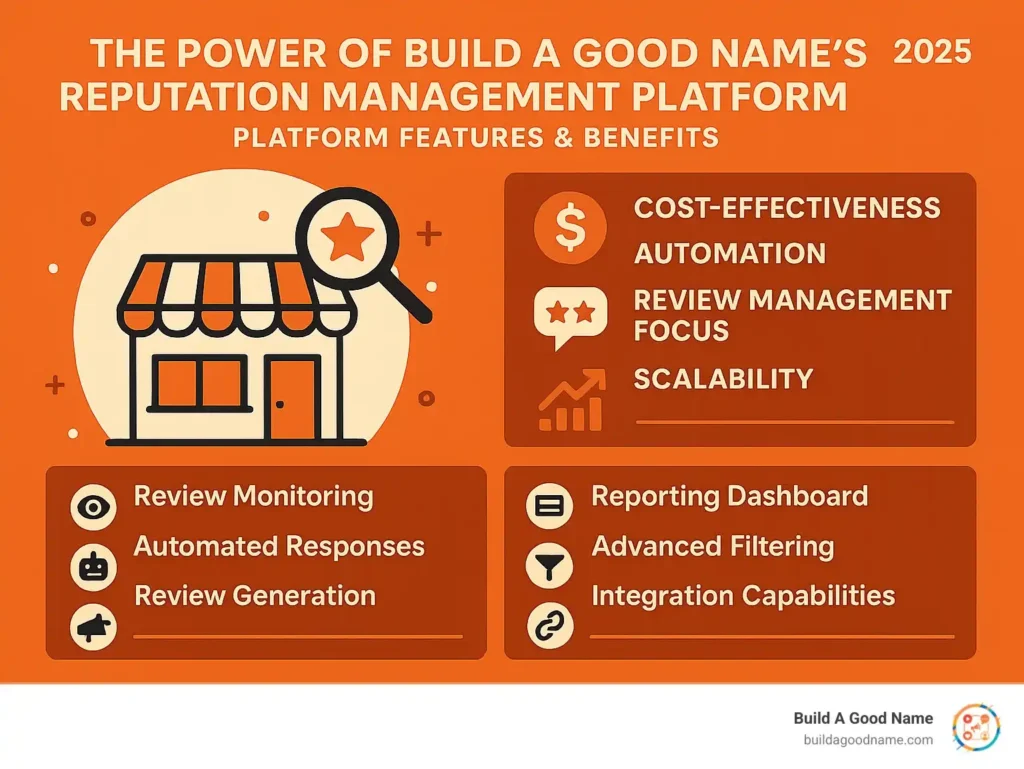
The bottom line? Online reputation management companies come in all shapes and sizes, but we believe the best solutions are the ones that actually fit your business. Our platform gives you professional-grade tools without the professional-grade complexity.
Frequently Asked Questions about Online Reputation Management
What are some examples of corporate reputation management?
Corporate reputation management is all about shaping how people see your company across different groups of stakeholders. It’s more comprehensive than just managing reviews—it touches every aspect of your public image.
Amplifying positive initiatives is a common strategy. When a company launches an eco-friendly product line or supports a community cause, reputation management helps spread this good news across social media, blogs, and news outlets. This builds brand equity and shows customers what you stand for.
Crisis communication becomes crucial when things go wrong. During a product recall or customer service mishap, online reputation management companies develop strategies to address issues transparently and rebuild trust. The key is responding quickly and honestly rather than trying to hide problems.
Talent attraction has become increasingly important. Companies use reputation management to promote positive workplace culture, share employee testimonials, and highlight company values. This helps attract top talent in competitive markets where skilled workers research potential employers online.
Investor relations involves managing how financial news and company performance are presented to maintain investor confidence. This includes controlling the narrative around earnings reports, leadership changes, and strategic decisions.
SEO for corporate searches ensures that when people search for your company name, they find positive, brand-controlled content rather than negative news or competitor information. This requires ongoing content creation and optimization.
How long does it take to see results from reputation management?
The timeline for reputation management results depends heavily on your starting point and what you’re trying to achieve. Here’s what you can realistically expect:
Immediate impact happens within the first week when you start responding to individual negative reviews. A professional, empathetic response can often neutralize negative sentiment quickly. Potential customers see that you care about feedback and are willing to make things right.
Short-term improvements typically show up within one to three months. Review generation campaigns start producing results as satisfied customers share their experiences. You’ll notice increased review volume and improved average ratings during this period.
Medium-term progress becomes visible after three to six months. Content suppression and SEO efforts begin showing results. Positive content starts ranking higher in search results, while negative content begins moving down in rankings.
Long-term change requires patience and persistence. On average, improving your reputation and getting long-term results takes anywhere from 6 to 12 months or longer, depending on your starting point and goals. This is especially true for businesses dealing with serious reputation damage.
Ongoing maintenance is essential because reputation and reviews decay over time. Even after achieving great results, you need continuous effort to maintain positive momentum. Think of reputation management as an ongoing investment rather than a one-time fix.
Can a company guarantee the removal of negative content?
This is one of the most important questions to ask when evaluating online reputation management companies. Be extremely cautious of any company that guarantees content removal—here’s why.
Platform policies vary significantly across different websites and review platforms. While some content can be removed if it violates platform rules (like fake reviews or inappropriate language), much legitimate negative feedback cannot be removed simply because you don’t like it. Each platform has its own terms of service and removal policies.
Legal limitations make content removal complex and uncertain. Even when legal action is possible, it’s expensive, time-consuming, and often generates more negative publicity than the original content. The Streisand effect is real—sometimes fighting negative content makes it more visible.
Focus on suppression is what reputable companies emphasize instead. Content suppression involves pushing negative content down in search results by creating and promoting positive content. This approach is more sustainable and often more effective than trying to remove content entirely.
Ethical considerations matter too. Attempting to remove legitimate customer feedback raises questions about transparency and can backfire if finded by customers or media. It’s better to address concerns openly and show how you’ve improved.
Realistic expectations are crucial for success. While some content removals may take just a few days or weeks, suppressing unwanted search results and building a strong, threat-resistant online presence can sometimes take 1-2 years, if not longer.
The most effective approach combines legitimate removal efforts for content that actually violates platform policies with comprehensive suppression strategies that build long-term reputation strength. This creates sustainable results rather than temporary fixes.
Conclusion: Take Control of Your Online Narrative
Your online reputation isn’t just another marketing concern—it’s the foundation of your business’s future success. With 97% of consumers researching businesses online before making purchasing decisions, every review, every social media mention, and every search result shapes your bottom line.
The digital landscape has fundamentally changed how customers find and evaluate businesses. Your reputation now works 24/7, influencing potential customers while you sleep, attracting or repelling top talent, and either building or eroding trust with every online interaction.
Online reputation management companies offer different paths forward. Some provide comprehensive enterprise solutions, while others focus on specific tools that address your most pressing needs. The right choice depends on your business size, budget, and current reputation challenges.
For most local businesses, the journey begins with mastering customer reviews. This isn’t just about collecting five-star ratings—it’s about creating systematic processes for gathering feedback, responding professionally to all reviews, and showcasing positive experiences in ways that build genuine trust.
Build A Good Name’s AI-powered platform simplifies this complex process. Instead of spending hours manually monitoring review sites and crafting responses, our automation handles the heavy lifting while maintaining the personal touch your customers expect. The result? More positive reviews, better response times, and a stronger online presence that drives real business growth.
The most successful businesses understand that reputation management has matured from simply burying negative content to guiding the conversation from the start. This proactive approach means building relationships before problems arise, creating positive content consistently, and responding to feedback in ways that demonstrate your commitment to customer satisfaction.
Think of reputation management as an investment, not an expense. Every positive review generates trust that converts browsers into buyers. Every professional response to criticism shows potential customers how you handle challenges. Every piece of positive content in search results reinforces your credibility.
The cost of inaction is simply too high. A single negative review can cost thousands in lost revenue. An unmanaged reputation crisis can devastate years of hard work. Meanwhile, businesses with strong online reputations enjoy higher conversion rates, better employee retention, and sustainable competitive advantages.
Don’t wait for problems to force your hand. Start building your positive online presence today, when you can be strategic and proactive rather than reactive and defensive. Review Management Software can be your first step toward changing your digital reputation from a vulnerability into your greatest business asset.
The question isn’t whether you can afford to invest in reputation management—it’s whether you can afford to leave your business’s future to chance. Take control of your online narrative now, and watch your reputation become the engine that drives your success.

